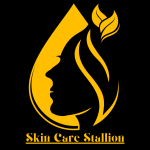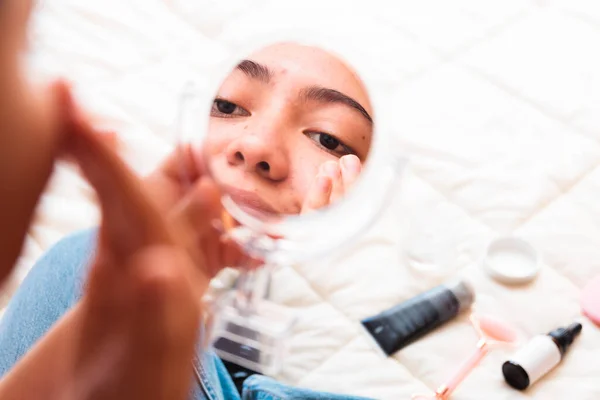Skincare Routine for Teenage Girl with Acne, Begin with a gentle cleanser to remove impurities without stripping the skin, followed by a salicylic acid toner to combat acne-causing bacteria, and moisturize with an oil-free lotion to keep the skin balanced and hydrated.
In the vibrant tapestry of adolescence, where self-discovery and identity intertwine, a teenage girl’s journey often encounters an unexpected companion acne. As the canvas of youthful exuberance unfolds, navigating the delicate balance between self-expression and skin care becomes a vital rite of passage.
Embracing the art of self-care, our guide unveils a personalized skincare routine tailored to the unique needs of teenage girls grappling with acne. Join us on this transformative odyssey as we unveil the secrets to radiant, confident skin, empowering the teenage spirit to bloom amidst the tapestry of adolescence. This isn’t just a skincare routine; it’s a celebration of individuality, resilience, and the radiant glow that lies beneath the surface.
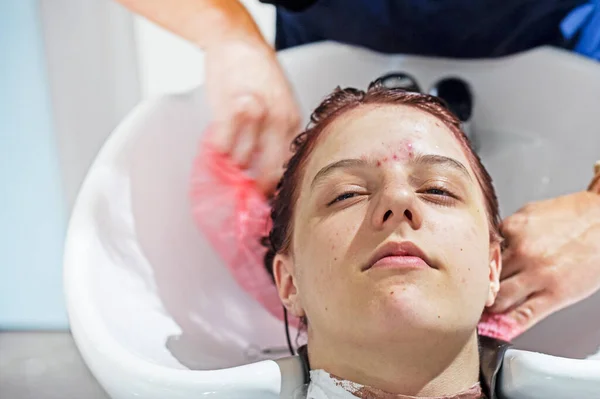
Table of Contents
ToggleSkincare Routine For Teenage Girl With Acne
Achieving clear and radiant skin for teenage girls with acne requires a diligent skincare routine tailored to their specific needs. Here’s a comprehensive guide to help you navigate through the complexities of skincare, providing tips and tricks to manage and prevent acne breakouts effectively.
Understanding the Teenage Skin
Teenage skin is often prone to hormonal fluctuations, leading to increased oil production and susceptibility to acne. It’s crucial to comprehend these factors to design a skincare routine that addresses the unique challenges faced by adolescent girls.
Gentle Cleansing to Start
Begin your skincare routine with a gentle cleanser. Look for products with salicylic acid or benzoyl peroxide to combat acne-causing bacteria. Cleanse your face twice daily to remove excess oil, dirt, and impurities that can clog pores and contribute to breakouts.
Hydration is Key
Contrary to common belief, moisturizing is essential even for acne-prone skin. Opt for oil-free, non-comedogenic moisturizers to maintain hydration without exacerbating acne. Well hydrated skin is better equipped to heal and resist future breakouts.
Spot Treatment and Targeted Solutions
Incorporate targeted treatments for acne spots using over-the-counter or prescription products. Spot treatments containing ingredients like tea tree oil or sulfur can help reduce inflammation and promote faster healing of blemishes.
Sunscreen Protection
Never skip sunscreen, even on cloudy days. Choose a broad-spectrum SPF of at least 30 to protect your skin from harmful UV rays. Sunscreen not only prevents sun damage but also ensures that acne scars and hyperpigmentation don’t worsen.
Consistency is Key
Consistency is crucial in any skincare routine. Stick to your regimen even when you see improvements to maintain healthy skin. Avoid the temptation to over-cleanse or pick at your acne, as this can lead to scarring and prolonged healing.
Understanding Acne
Types of Acne
Acne manifests in various forms, including whiteheads, blackheads, papules, pustules, nodules, and cysts. Each type presents unique challenges, and discerning between them is crucial for effective treatment. People often refer to acne as “pimples,” “zits,” or “breakouts,” emphasizing the common language surrounding this skin condition.
Common Causes
Unraveling the mystery behind acne requires exploring its multifaceted origins. Hormonal fluctuations, excess oil production, and the accumulation of dead skin cells often contribute. Environmental factors, such as pollution and humidity, can exacerbate the condition. People commonly associate acne with phrases like “blemishes,” “skin imperfections,” or “acne-prone skin,” reflecting a shared vocabulary within the skincare community.
Identifying Acne Triggers
Pinpointing the triggers that incite acne is essential for effective prevention. Factors like diet, stress, and certain medications may play pivotal roles. Individuals often describe acne triggers using terms like “breakout inducers,” “skin irritants,” or “acne culprits.” Recognizing these triggers empowers individuals to adopt targeted skincare routines and make informed lifestyle choices for clearer, healthier skin.
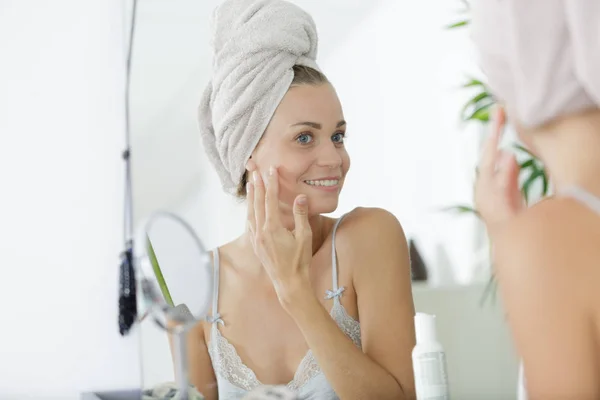
Daily Skincare Routine
Morning Routine
Cleansing
Choosing a Gentle Cleanser
Start your day by selecting a mild cleanser to prevent stripping essential oils.
Proper Cleansing Technique
Gently massage the cleanser using circular motions, ensuring thorough yet gentle cleansing.
Toning
Alcohol-Free Toners
Opt for toners without alcohol to avoid skin dryness and irritation.
Balancing Skin pH
Choose a toner that helps balance your skin’s pH, promoting a healthy complexion.
Treatment
Spot Treatments for Active Acne
Address blemishes with targeted spot treatments containing ingredients like tea tree oil.
Benzoyl Peroxide or Salicylic Acid
Incorporate acne-fighting ingredients like benzoyl peroxide or salicylic acid for effective treatment.
Moisturizing
Non-Comedogenic Moisturizers
Select moisturizers labeled as non-comedogenic to prevent pore clogging.
Hydration for Acne-Prone Skin
Hydrate your skin with a lightweight, water-based moisturizer suitable for acne-prone skin.
Sunscreen
Broad-Spectrum SPF
Shield your skin from harmful UV rays
with a broad-spectrum sunscreen.
Sunscreen Application
Apply sunscreen generously and evenly, especially on exposed areas, to safeguard against premature aging.
Evening Routine
Cleansing
Double Cleansing for Makeup Removal
Begin your evening routine with a double cleanse, using an oil-based cleanser to remove makeup followed by a gentle cleanser.
Avoiding Harsh Scrubbing
Be gentle when cleansing; avoid harsh scrubbing to prevent skin irritation.
Exfoliation
Weekly Exfoliation with Mild Products
Incorporate mild exfoliants weekly to remove dead skin cells and promote skin renewal.
Importance of Exfoliating for Acne-Prone Skin
Exfoliation helps unclog pores, reducing the risk of acne breakouts.
Treatment
Prescription or Over-the-Counter Acne Medications
Consult a dermatologist for personalized acne medications, whether prescription or over-the-counter.
Adapting Treatment Based on Skin Response
Monitor your skin’s response to treatments and adjust as needed for optimal results.
Moisturizing
Night-Specific Moisturizers
Use moisturizers designed for nighttime use, promoting skin repair and rejuvenation.
Hydrating Ingredients like Hyaluronic Acid
Look for night creams with hydrating ingredients like hyaluronic acid for added skin nourishment.
Spot Treatment
Overnight Acne Patches or Gels
Apply targeted overnight treatments, such as acne patches or gels, to accelerate the healing of blemishes.
Additional Tips
Incorporating an optimal skincare routine involves more than just topical treatments; it extends to holistic practices for lasting results. Begin with Section IV, focusing on Additional Tips to elevate your skincare game.

Diet and Hydration
Importance of a Balanced Diet
Nourish your skin from within by embracing a balanced diet rich in vitamins, antioxidants, and essential nutrients. A nutrient-dense diet fosters skin health and radiance, addressing concerns beyond surface-level issues.
Staying Hydrated for Healthy Skin
Hydration is key to a supple complexion. Amp up your water intake to keep your skin adequately moisturized. Hydrated skin not only appears more youthful but also functions optimally in combating external stressors.
Avoiding Skin Irritants
Fragrance-Free Products
Opt for fragrance-free skincare products to minimize the risk of irritation. Fragrance-free alternatives cater to sensitive skin types, ensuring a gentle yet effective approach to skincare.
Identifying and Avoiding Potential Irritants
Scrutinize ingredient lists to spot potential irritants. Stay vigilant for common culprits such as sulfates, parabens, and artificial dyes. A cautious selection of products shields your skin from unnecessary irritations.
Regular Dermatologist Visits
Seeking Professional Advice
Prioritize regular visits to a dermatologist for personalized guidance. A dermatologist’s expertise ensures a tailored approach, addressing specific concerns and optimizing your skincare regimen.
Customizing the Routine Based on Dermatologist Recommendations
Implement dermatologist-recommended changes to your routine. Tailoring your skincare regimen based on professional advice ensures a proactive and effective approach to maintaining healthy, radiant skin.
Dealing with Acne Scars
Addressing acne scars is a common concern, and understanding prevention measures is crucial. To thwart acne scarring, adopt a consistent skincare routine featuring non-comedogenic products. Employing sun protection is vital, as UV rays can exacerbate scarring. Now, let’s delve into treatment options.
Dermatological procedures such as laser therapy and chemical peels offer respite, targeting scar tissue. Topical retinoids accelerate skin cell turnover, aiding in scar reduction. Over-the-counter creams with ingredients like alpha hydroxy acids are popular choices. Remember, a holistic approach combining prevention and treatment ensures a smoother journey towards flawless skin.
Building Consistency and Patience
In the pursuit of personal development, Section VI delves into the crucial aspects of Building Consistency and Patience.
Undoubtedly, emphasizing the importance of a consistent routine stands out as a cornerstone for progress. Establishing a steady rhythm in daily activities, adhering to a structured schedule, and maintaining regular habits are essential practices.
Equally significant is the art of managing expectations and being patient with results. Navigating the journey of self-improvement requires understanding that transformation is a gradual process. Embracing this truth fosters resilience, perseverance, and a positive mindset.
Both components, a consistent routine and patience in awaiting outcomes, synergize to create a sustainable path toward personal growth. As individuals seek guidance in fostering discipline and enduring the journey, the phrases “steadfast routine,” “long-term perspective,” and “patient progress” resonate as common expressions within this transformative narrative.
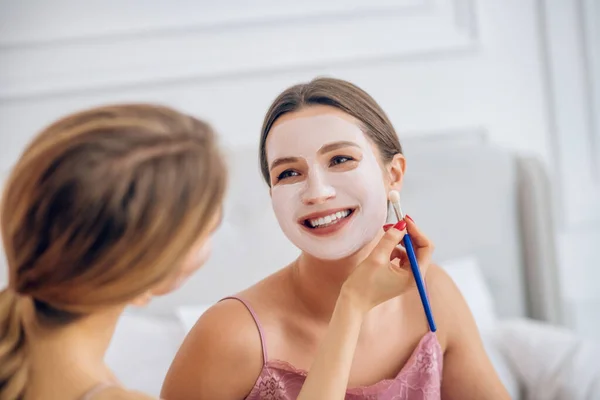
FAQs
What is the importance of a skincare routine for teenage girls with acne?
A skincare routine is crucial for managing acne in teenage girls as it helps cleanse, treat, and protect the skin, promoting a healthier complexion and boosting confidence.
How often should a teenage girl with acne cleanse her face?
It is recommended to cleanse the face twice a day morning and night to remove excess oil, dirt, and bacteria that can contribute to acne breakouts.
Can I use any cleanser for acne-prone skin, or are there specific ingredients to look for?
Opt for a gentle cleanser with ingredients like salicylic acid or benzoyl peroxide, known for their acne-fighting properties. Avoid harsh chemicals that may irritate the skin.
Is moisturizing necessary for acne-prone skin?
Yes, moisturizing is essential. Choose a non-comedogenic, oil-free moisturizer to keep the skin hydrated without clogging pores.
What products should be included in a basic skincare routine for a teenage girl with acne?
A basic routine includes a gentle cleanser, acne-fighting treatment (like benzoyl peroxide or salicylic acid), oil-free moisturizer, and a broad-spectrum sunscreen.
Can makeup worsen acne in teenagers, and should it be avoided?
Some makeup products can exacerbate acne. Look for non-comedogenic and oil-free options. It’s also crucial to remove makeup before bedtime to prevent clogged pores.
How can a teenage girl deal with acne scars or hyperpigmentation?
Products containing ingredients like vitamin C, niacinamide, and alpha hydroxy acids can help fade acne scars over time. However, consistency is key, and it’s advisable to consult with a dermatologist for personalized advice.
Is it safe for a teenager to use spot treatments for acne?
Spot treatments with benzoyl peroxide or salicylic acid can be used, but they should be applied sparingly to affected areas. Excessive use may lead to dryness or irritation.
Should a teenage girl with acne exfoliate her skin?
Exfoliation can help remove dead skin cells, but it should be done with caution. Use a mild exfoliant once or twice a week to avoid over-exfoliation, which can worsen acne.
How long does it take to see improvements in acne with a consistent skincare routine?
Results vary, but with a consistent and personalized skincare routine, improvement can often be seen within a few weeks. However, patience is key, and individual responses may differ.
Conclusion
In conclusion, establishing a consistent skincare routine tailored to the specific needs of a teenage girl with acne is crucial for promoting clear and healthy skin. The journey to clearer skin involves a combination of gentle cleansing, targeted treatments, and proper moisturization. By incorporating these practices into a daily routine, not only can acne be effectively managed, but overall skin health can be improved.
Additionally, it’s important for teenagers to be patient and persistent in their skincare efforts, as results may take time to manifest. Empowering young individuals with the knowledge and habits for a proper skincare routine not only addresses the immediate concern of acne but also sets the foundation for a lifetime of healthy skin practices.
